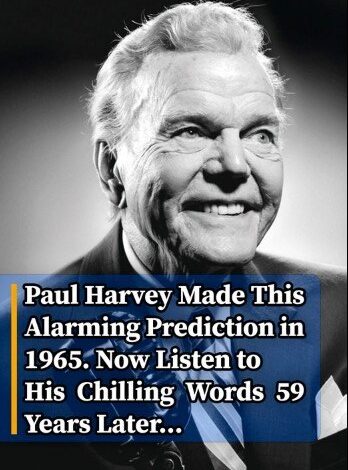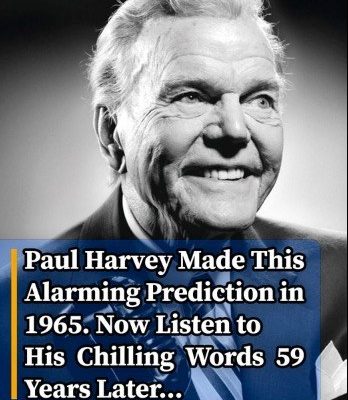
In 1965, legendary broadcaster Paul Harvey delivered a radio segment that, at the time, seemed like a clever piece of moral commentary. Titled “If I Were the Devil,” it was a hypothetical reflection—a thought experiment in which Harvey imagined how evil itself might slowly dismantle the moral and spiritual fabric of a society. It aired to millions across America, who heard it as a warning. But now, six decades later, those same words sound eerily prophetic.
Harvey didn’t describe chaos erupting through violence or sudden collapse. Instead, he described something more insidious—corruption through comfort, decay through distraction. “If I were the Devil,” he began in his signature calm, deliberate tone, “I wouldn’t try to destroy a nation by force. I would whisper. I would whisper: Do as you please.”
He painted a picture of temptation disguised as progress, of moral erosion disguised as freedom. “I’d convince the young that the Bible is a myth,” he continued. “I’d tell them man created God instead of the other way around. I’d take God out of the courthouse, out of the schoolhouse—and even out of the churches.”
At the time, the words struck listeners as exaggerated, maybe even theatrical. After all, it was 1965—an age of optimism, prosperity, and cultural transformation. The nation was exploring space, expanding opportunity, and imagining a brighter future. Few could imagine that Harvey’s quiet forecast would one day sound less like fiction and more like news.
He spoke about families breaking apart, about drugs and alcohol being peddled freely, about people praying not to God but to government. “I’d replace wisdom with pleasure,” he said. “Truth with opinion—and call it freedom.”
It was a chillingly simple blueprint for societal decline, yet it wasn’t couched in politics or religion. Harvey wasn’t raging against any one party, faith, or ideology. He was warning against complacency—the slow moral drift that happens when comfort replaces conviction.
For many listeners today, his words feel less like a sermon and more like a mirror. The technological and cultural revolutions that came after 1965 brought astonishing progress, but they also brought fragmentation. The noise of modern life—the endless media, the digital arguments, the constant craving for validation—makes Harvey’s quiet “whisper” analogy feel hauntingly accurate.
When he said, “I’d keep doing it until the world slipped quietly into my hands,” he might not have imagined smartphones, social media, or algorithmic outrage. Yet his message fits the age perfectly: corruption rarely storms the gates; it seeps in through the cracks of distraction, greed, and pride.
In the decades that followed, Harvey’s monologue resurfaced again and again. It was played on talk shows, reprinted in newspapers, shared in classrooms, and forwarded through emails. It has since found new life on YouTube and social media, where millions of people—many born long after the broadcast—hear it for the first time and feel its sting.
The reason is simple: truth doesn’t expire. Harvey’s voice may belong to another century, but his insight transcends it. The erosion he described isn’t about religion alone—it’s about values, responsibility, and awareness. It’s about what happens when a society forgets how to self-regulate and loses sight of the discipline that freedom requires.
Harvey himself once said, “Self-government won’t work without self-discipline.” That line, often overlooked, might be the heart of the entire message. His warning wasn’t just about temptation or immorality—it was about what happens when a free people forget how to control themselves.
In his time, Harvey was a master storyteller, a journalist who believed in personal integrity, faith, and the strength of community. His broadcasts were never sensational or angry; they were thoughtful and precise. “If I Were the Devil” wasn’t a rant—it was a reflection. He asked his audience to consider not just what they believed, but how they lived.
And that’s why, more than half a century later, it still resonates. His imagined “devil” doesn’t conquer through fire or fear; it wins by offering ease, distraction, and the illusion of moral neutrality. It convinces people that right and wrong are flexible, that truth is relative, and that comfort matters more than character.
Today, as societies wrestle with division, misinformation, and moral fatigue, Harvey’s voice sounds almost like it was recorded yesterday. The imagery he used—of a culture that replaces wisdom with pleasure and conscience with convenience—feels like a commentary on our current moment.
Yet his message was never meant to inspire despair. At its core, it was a call to awareness. A challenge to choose clarity over chaos, virtue over vanity, responsibility over indulgence. The devil, in Harvey’s view, thrived not because people were evil, but because they were distracted.
Perhaps that’s what makes the speech so unsettling today: not the idea that he predicted the future, but that he understood human nature so well. His “prophecy” isn’t supernatural—it’s psychological. It’s about what happens when people stop guarding their values and start surrendering to whatever feels good in the moment.
The enduring power of “If I Were the Devil” lies in its simplicity. It’s not about fear—it’s about vigilance. It’s a reminder that the things that make a nation strong—faith, family, truth, humility, discipline—are fragile if taken for granted.
And though Harvey’s voice has long gone silent, the echo of his message grows louder with time. It’s passed from one generation to the next, not as a sermon, but as a mirror—reflecting who we’ve become, and what we might still have the power to change.
If his words stir something in you, that’s the point. They were meant to. Not to frighten, but to wake up the conscience. Because sometimes the clearest warning doesn’t come from fire and brimstone—it comes from a whisper that refuses to fade.



